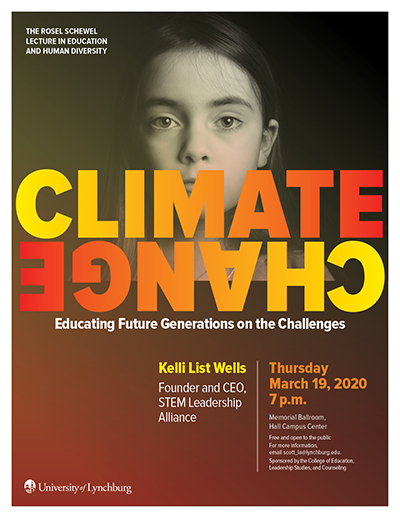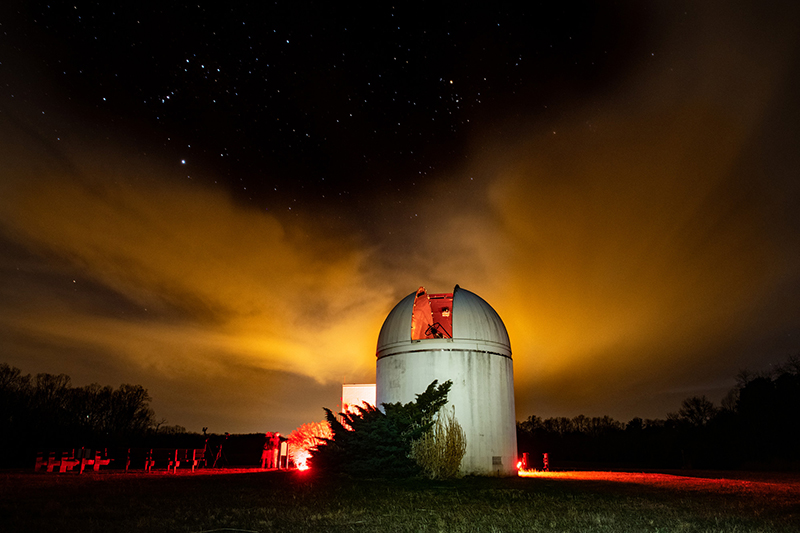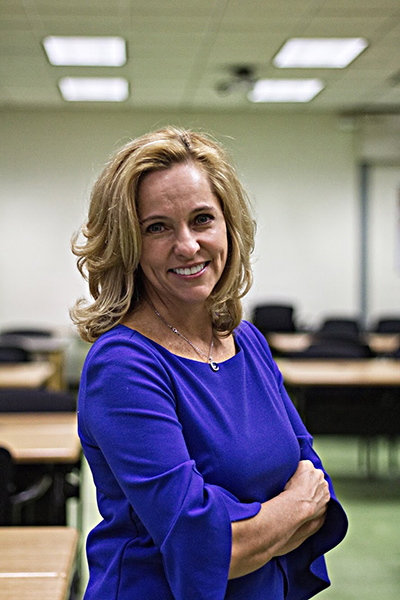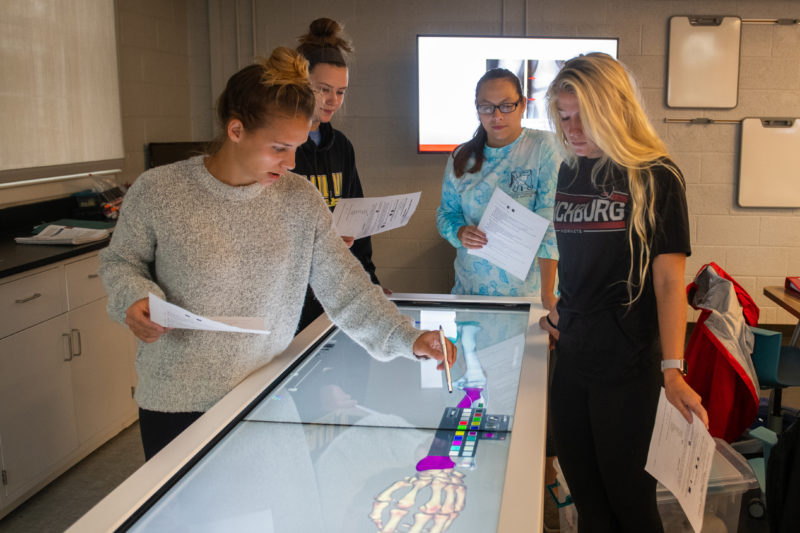Due to the University’s ongoing efforts to stem the spread of COVID-19 (coronavirus), this event has been canceled.
The University of Lynchburg’s 2020 Schewel Lecture in Education and Human Diversity is all about our planet’s future — and making sure younger generations are informed and prepared.
 “Climate Change: Educating the Next Generations on the Challenges,” will be presented by Kelli List Wells, founder and CEO of the STEM Leadership Alliance. The free, public event takes place at 7 p.m. Thursday, March 19, in the Memorial Ballroom at Hall Campus Center.
“Climate Change: Educating the Next Generations on the Challenges,” will be presented by Kelli List Wells, founder and CEO of the STEM Leadership Alliance. The free, public event takes place at 7 p.m. Thursday, March 19, in the Memorial Ballroom at Hall Campus Center.
Earlier that day, Wells will lead an interactive workshop with about 110 students from 11 public high schools — Staunton River, Liberty, Jefferson Forest, Brookville, William Campbell, Rustburg, Amherst, Heritage, E. C. Glass, Nelson, and Altavista. The workshop takes place from 10 a.m. to noon in the same location.
“Following the renewed awareness of climate change brought to the international stage by Greta Thunberg, the selection committee felt that it was important to build on that momentum,” said Michael Kelly, who teaches in Lynchburg’s education department and serves as director of field experiences and teacher licensure.
“Science has been under attack by our current administration at the national level, and we think it is important to reemphasize how critical it is for our schools to prepare students with the skills to assess and make decisions based on facts.”
Dr. Autumn Dodge, an assistant professor of education and a member of the Schewel Lecture selection committee, agrees.
“Our current generation of students deserve a future that is not ravaged by the catastrophic effects of climate change,” Dodge said. “Our young people need to have a voice, and to have a voice they need to be educated about the factors influencing climate change, and what actions can be taken to salvage the future of our planet.”
Many future challenges, Kelly notes, are based on science, technology, engineering, and math (STEM). Wells will talk about integrating these subjects across the K-12 curriculum.
“It’s important to make sure our children become informed citizens,” Kelly said. “We need to be able to understand science in order to critically participate in policy making — and to select government representatives who have an understanding of these topics.”

At the University of Lynchburg, STEM runs through the entire curriculum, from general education courses to bachelor’s, master’s, and doctorate degrees. In addition, Lynchburg’s Noyce Scholarship Program for STEM teachers offers significant scholarships to students who want to teach STEM subjects.
That should be great news for Wells, who emphasizes that the jobs of the future are in STEM.
“It looks like all jobs by 2030 will be STEM jobs, or involve the critical thinking that STEM provides,” Wells said. “By addressing this critical challenge, we hope to help people around the world — by building a collaborative culture, boosting employability, and helping to equip people for the future of work.”
It’s not just about job security, of course. Climate change is a huge problem, Wells says.
“The world is changing, weather patterns are shifting, oceans are rising, glaciers are melting. This may all seem far away, but it is relevant to all of us,” she added. “We must take care of our environment and we must teach our students how to care for their communities … Students are our future and they are the ones that will — and must — find a solution to these problems.”

To help tackle that challenge, Wells founded the STEM Leadership Alliance, which includes major STEM organizations such as NASA and the American Society for Engineering Education, along with schools, businesses, and nonprofits.
STEM education has dominated much of her career.
For 25 years, she was the executive director for global education and skills at the GE Foundation. There, she focused on building initiatives to prepare the next generation for the changing national and global labor economy.
“Having the opportunity to touch so many diverse areas of the business really shaped who I am as a leader,” Wells said. “I learned the importance of being able to adapt and having a willingness — and eagerness — to take on new challenges.”
Both are crucial skills in today’s environment, Wells adds, with companies undergoing drastic transformation.
“As a leader, you have to keep up with and stay ahead of these changes,” she said. “My own career has taught me how to do this, namely by being agile and embracing challenges. This is a fundamental part of who I am as a person, and as a leader today.”
Through her work in the PreK-12 education systems, Wells has reached more than 10,000 teachers and 1.3 million students across more than 2,000 public schools, saving school districts over $20 million. Along the way, she realized that K-12 wasn’t enough.
“As I visited schools and businesses throughout the country and brought international business and education leaders together, I found that we shared what we saw as a real threat to our youth and the global economy — and that is the skills gap,” Wells explained. “That skills gap is largely driven by the lack of individuals pursuing STEM careers and STEM degrees.”

In response, Wells created the Brilliant Career Labs: physical and virtual learning experiences that help students explore careers, as well as understand the skills required for jobs that use digital fabrication. And she secured the Boston Celtics as a partner.
Wells has worked tirelessly to lobby for science on every level. Before leading the first Asia Integrated STEM Leadership Alliance in the Philippines in November 2019, she led a national conference with more than 325 leaders in STEM education that included 28 states and four countries.
She also served on the governor’s Massachusetts STEM Advisory Council and on the Stamford, Connecticut Mayor’s Council for Early Childhood Readiness. Currently, Wells sits on the boards for the Bridgeport Public Education Foundation, the Center for Supportive Schools, and the Women in Manufacturing Association.
For Wells, who studied international relations and Japanese at the University of Massachusetts Amherst and continued her education at Nanzan University in Nagoya, Japan, all of that drive and perseverance started at home.
“When I was growing up, my parents taught me the importance of giving back, so I’ve always been passionate about doing what I can to create access and equity for people, especially children,” Wells said. “Equally important is the travel I have done and the travel opportunities I have given my children. We have visited some of the poorest countries in the world.
“Helping to build a house, cleaning a yard or bringing clothing to children who have none — these are the things that have shaped my life and that of my family.”
The Schewel lecture is sponsored by the College of Education, Leadership Studies, and Counseling. For more information, email pickett_cm@lynchburg.edu.

